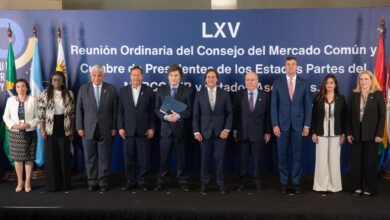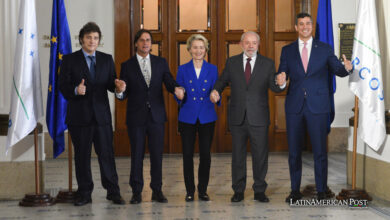Environmental Guarantees in the Agreement Between the EU and Mercosur are at Stake
Lula has been dissatisfied with the environmental demands that the European Union asks for in the agreement with Mercosur. Where is the environment?.

Photo: Pixabay
LatinAmerican Post | María Fernanda Ramírez Ramos
Escucha este artículo
Leer en español: Garantías ambientales en el acuerdo de la Unión Europea y Mercosur están en juego
Negotiations between the European Union (EU) and Mercosur (a bloc made up of Argentina, Brazil, Paraguay, and Uruguay) for a trade agreement lasted approximately 20 years and ended in June 2019. However, 4 years later, the process has not been ratified and could take even longer because the EU is demanding that an instrument be added to the agreement that contemplates environmental protection by both parties.
Faced with this, the president of Brazil, Lula da Silva, has been dissatisfied, arguing that no country has reached the Paris Agreements, that they are voluntary goals and that these should not be a requirement. According to him, this addition would increase the demands on Brazil and would put it against the wall, since if it were not fulfilled, the country would be penalized. For him, this is unacceptable. "The premise that must exist between strategic partners is mutual trust, and not mistrust and sanctions," he said.
Likewise, Alberto Fernández, president of Argentina, spoke assuring that Mercosur is interested in establishing the Agreement, but that both parties must have the same benefits.
This disagreement responds, firstly, to the fact that a unilateral letter was received with the demands; that is, there was no negotiation. Second, to the fact that the economies of the EU countries are already established, and the vast majority are rich countries that do not have a large amount of external debt; however, the case of Latin American countries is different. In other words, fully complying with the environmental requirements of the Agreement would hinder the economic growth of the Mercosur countries.
Likewise, Lula defended himself by assuring that Brazil cannot be questioned about its commitment to the energy transition and the reduction of greenhouse gas emissions. “No one has the right to give recommendations to Brazil on energy. Of our electricity, 87% comes from renewable sources, against 27% in the rest of the world. And of our energy matrix as a whole, including fuels, 50% is clean and renewable, against 15% in the rest of the world”, he said.
For her part, the President of the European Commission, Ursula von der Leyen, is optimistic about closing the Agreement at the end of this year and considers that a resolution of the latest changes that the EU has proposed can be reached. However, experts say that the process will most likely be further delayed, since both Brazil and Argentina probably cannot meet the demands that are being made of them.
We recommend you read: UN Adopts a Global Agreement to Protect Marine Biodiversity
Where is the environment?
The points raised by Lula and Fernández make sense in a panorama of economic growth, it is true that the Paris Agreements are voluntary and do not entail sanctions if they are not complied with, and European countries have an easier time adjusting to these requirements. However, in the context of climate and environmental emergencies, it is necessary that there are regulations that not only give the possibility of opting for sustainability measures, but also require compliance with certain parameters. Environmental guarantees are not based on simple threats, they are based on an emergency that puts the health of the planet and, consequently, human health at risk.
The truth is that Latin America has less chance of achieving these objectives because sustainability is more achievable in countries that have already achieved development. Developing countries have economic, social and cultural barriers that prevent them from meeting the objectives set by much stronger economies and with sufficient resources to achieve them.
In addition, Latin America is one of the regions most affected by climate change, but not because of what it has produced with its own hands, but because precisely these world powers have been extractive and have generated pollution that ends up in landfills in the global south.
In this sense, although it is problematic that parts of Mercosur show disagreement with the environmental guarantees that the EU demands in the Agreement, it is also problematic that the EU does not make demands without first evaluating the purchasing power, the possibilities to achieve objectives and, even, their own responsibility in the climate crisis in the Latin American region.
Of course, it is necessary to add environmental requirements to the agreement and focus on specific problems such as deforestation, one of those that most affects the region, but the demands must be on both sides and level.




